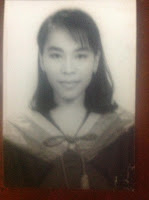So what you gonna be when you grow up? My father asked me this question when I was still a little girl. In answer to him, I hummed the tune of "Que Sera, Sera", What ever will be, will be". This song was in my head even at that early age.
What I actually wanted was to have a title besides my name. I remember there were moments that I tried to imagine being a Doctor or a Lawyer. Then reality came crushing, a doctor?? No, that's not gonna happen .. too expensive , Mama and Papa can’t afford it besides, my head said, a disabled person could not be a doctor. OK, so how about a lawyer??? Hmm… still expensive and requires lots of years in school.
Getting to the Bachelor of Science in Civil Engineering degree was harder than ever financially, because by then my father was already dead due to politics and unrest in the area, where he was farming. It was only my mother who struggled and solely paid for mine and my two siblings' education. But hard work and commitment to my studies finally brought me the title I dreamed for. In 1992, I received my license as a full-pledged Civil Engineer.
 |
| During the Oath Taking Ceremony |
I was also actively involved in our local disabled organization. The group wanted someone from the disabled sector to be employed in the Building Office, to monitor and implement the Accessibility Law. This led to my designation as the Accessibility Officer of the Office of the City Building Official, year 1998-2005.
 |
| Job Description |
Through this all, It was the hard work and sacrifices of my parents, specially my Mama who helped and guide me to achieve my plans and dreams. For that, I am thankful to the Lord, my God.






